
Bluesky Exits Mississippi Market over Age Verification Rule
The controversy surrounding TikTok in the U.S. remains unresolved, and new age verification laws are blowing up social media platforms. On August 23, 2025, Bluesky announced the shutdown of its services in Mississippi, sparking public debate. Perhaps this is just a start…
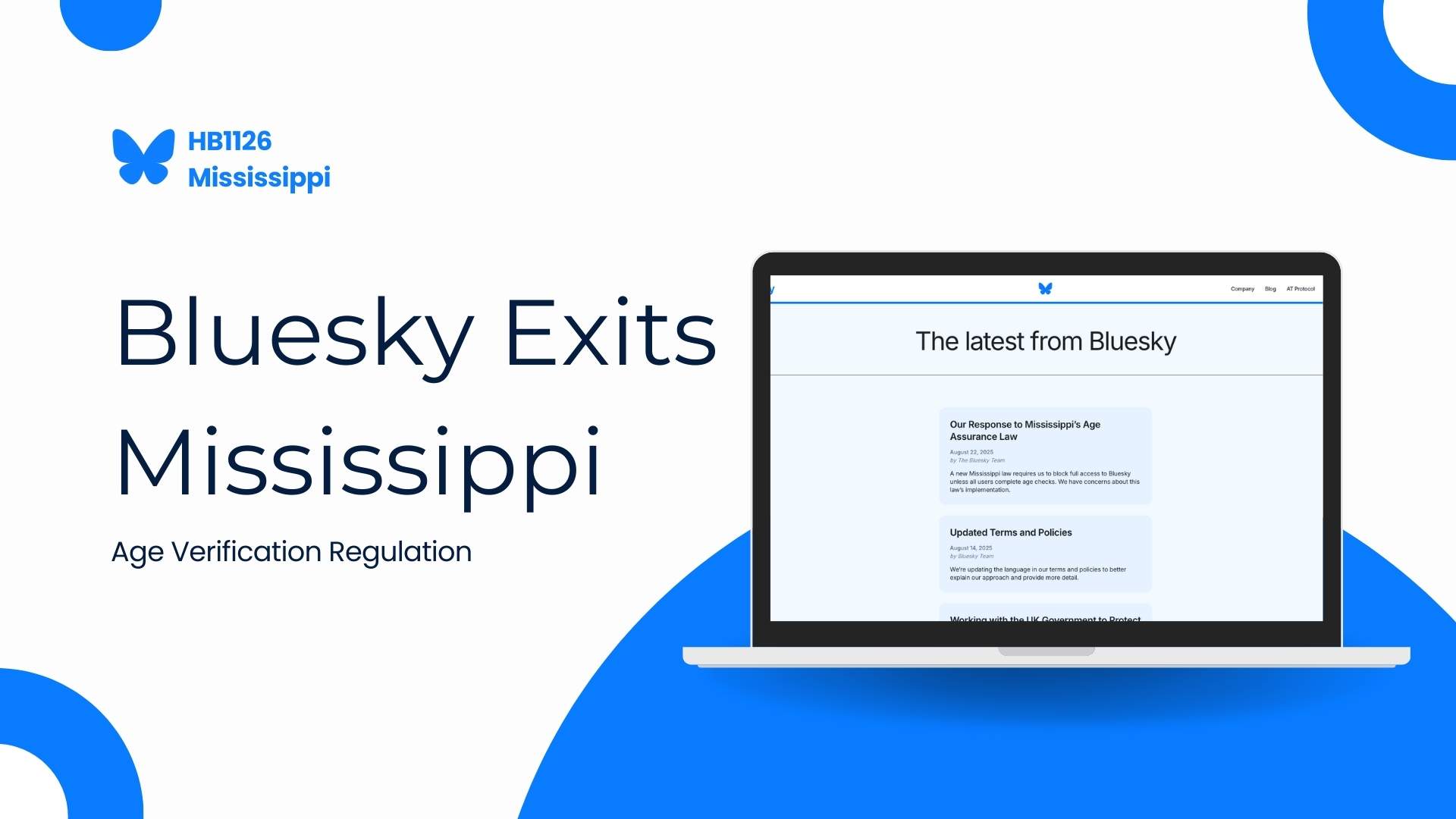
Table of Contents
Unpacking Mississippi HB1126: How a Law Forced Bluesky Out
The law in question, House Bill 1126, aims to “protect minors from harmful content”, as it states. How could a law about “child safety” force Bluesky out? Let’s dismantle it and see what it actually stipulates.
1. Who is Targeted? Digital Service Provider
The definition of “digital service provider” is extremely broad, but this act applies only to providers that allow users to create a bio, interact with other users, and post content.
What does this mean? It targets not only social media giants like Facebook, X(former Twitter), and Instagram, but also precisely covers smaller social platforms with limited resources like Bluesky.
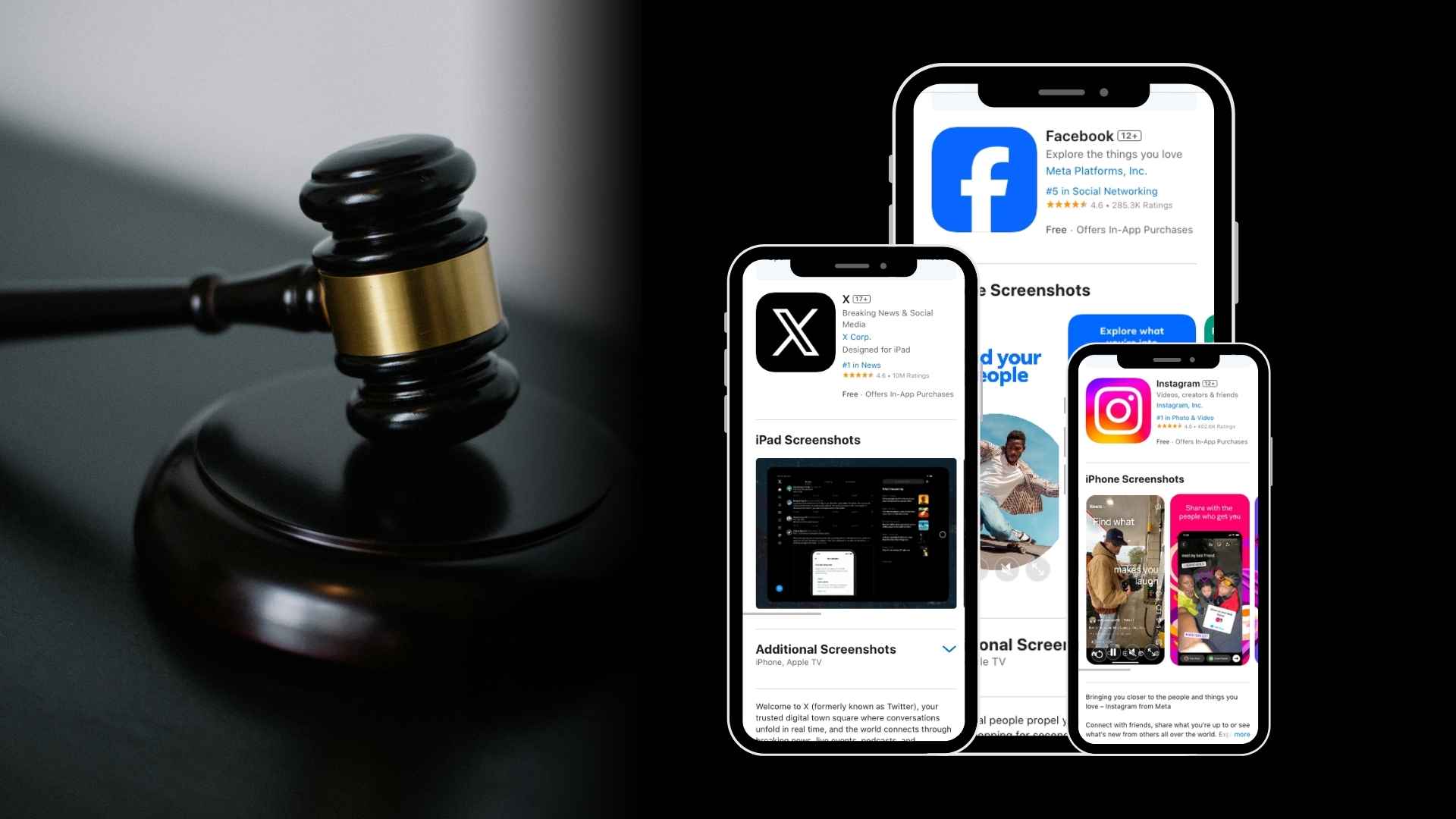
2. What Is Required? Strict Age Verification
This bill requires EVERY user to register their age before they can create an account. Service providers need to make reasonable efforts to verify the age and prevent minors from becoming account holders unless they obtain parent/guardian approval through the methods listed.
Where digital services are known to be used by minors, providers should implement strategies to prevent them from being exposed to harmful material, which may include some form of user data collection.
3. When? July 1, 2024
You may wonder why SECTION 10 writes that the regulation will be in force from and after July 1, 2024, but Bluesky shut down in August 2025. The law’s enforcement was halted through the efforts of many parties.
Tech industry group NetChoice instantly sued and obtained a preliminary injunction from U.S. District Judge Halil Suleyman Ozerden. After a year-long legal battle, the injunction was ultimately lifted by the Fifth Circuit, and the Supreme Court declined to intervene, forcing Bluesky to comply or exit.
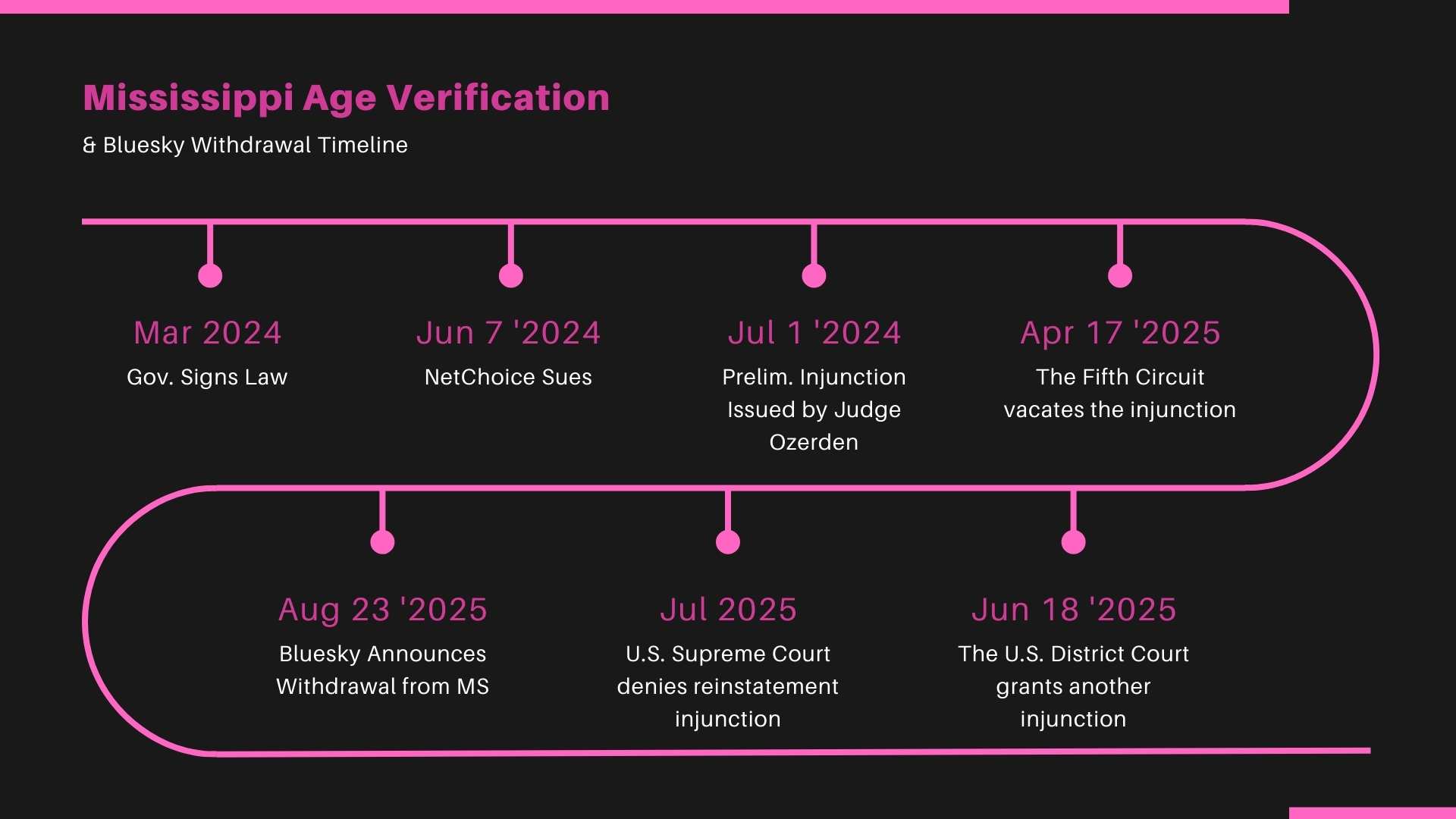
4. Punishment? Private Right of Action
The law allows any parent or guardian of a minor affected by the violation to file a legal action for a declaratory judgment under Rule 57 of the Mississippi Rules of Civil Procedure(SECTION 7(2)). This is why Bluesky cited an unmanageable risk of “up to $10,000 in damages per user” as a key reason for its withdrawal.
Bluesky’s Response to the New Regulations
Bluesky’s response to Mississippi’s Age Assurance Law brings the issue to a new climax, highlighting their concerns over Mississippi’s approach.
Bluesky’s Action
In response to the enforcement of Mississippi’s HB1126, Bluesky made the difficult decision to block access for all users based in Mississippi. Users who access Bluesky from a Mississippi IP will see a message explaining why the app is unavailable. This ban will remain in effect until a court rules on the validity of the law.
Reasons Behind Their Decision
Bluesky’s decision was driven by several core concerns. Firstly, the company believes age-verification systems require a lot of technology, time, and complex privacy protections. The ongoing compliance checks are overwhelming for smaller service providers too.
Secondly, they argue that the law’s approach of verifying every user, rather than focusing on minors or specific content, creates a significant barrier to free speech and open access to public discourse.
Comparison of UK OSA & MC HB1126
Bluesky compared the Mississippi law to the UK’s Online Safety Act (OSA). They pointed out a key difference in approach: the UK law primarily requires age verification only for harmful content, rather than for access to entire platforms. They argue this is a more targeted and less intrusive approach to protecting minors.
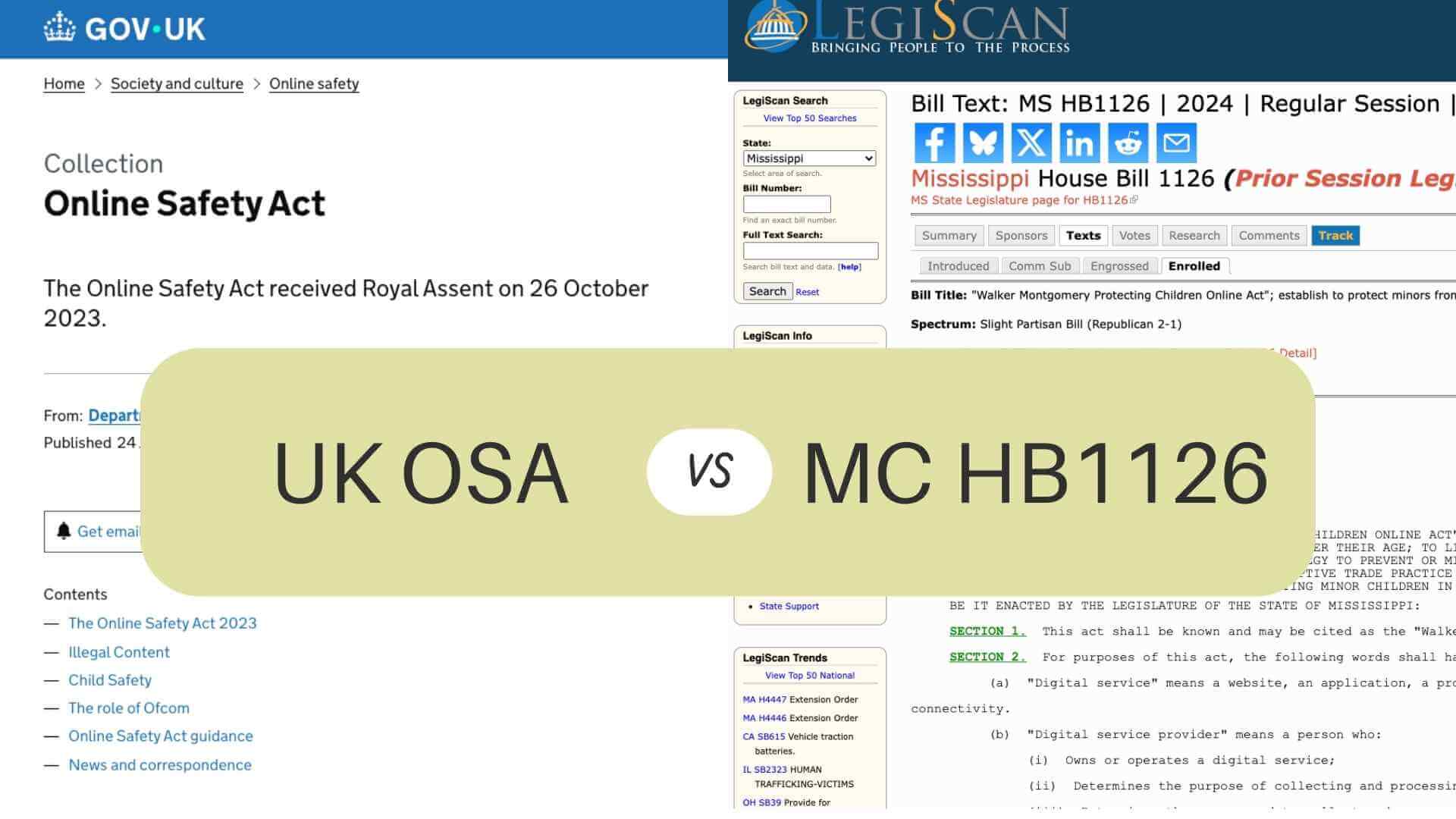
Concerns over Mississippi’s Approach
Bluesky expressed their concerns over the Mississippi’s action. Instead of those accessing age-restricted content, the law requires age verification for all users. Every Bluesky user in Mississippi must submit sensitive personal information and undergo an age check to visit the site, which greatly impacts accessibility.
Also, compliance requirements penalize smaller, newer platforms like Bluesky, which lack large teams to build the necessary tools. The law also requires platforms to identify and track which users are children, which Bluesky believes outweighs its child safety objectives.
Public Backlash: Outrage, Mockery, and VPNs
Users on Reddit and Bluesky have been overwhelmingly negative, angry, and skeptical. Some are happy to offer advice for hassle-free access.
Many people believe the law is absurd, arguing that its real aim isn’t child safety, but to restrict free speech and impose authoritarian control. This approach is a familiar tactic used to promote control, and the situation will worsen as this model spreads.
Sarcastic will never be late on Reddit. One user suggested suing search engines like Google and Bing for letting people search without verifying their age. Others showed a sense of resignation for people in Mississippi, commenting things like, “Enjoy Reddit while you can. Things will be different in the near future.”
A direct consequence already emerging is a surge in interest in VPNs. Just like the 1,800% Surge in VPN use as the UK’s Online Safety Act (OSA) came into force. A UK Reddit user just shared how a VPN “worked like a charm” and was quickly followed by recommendations.
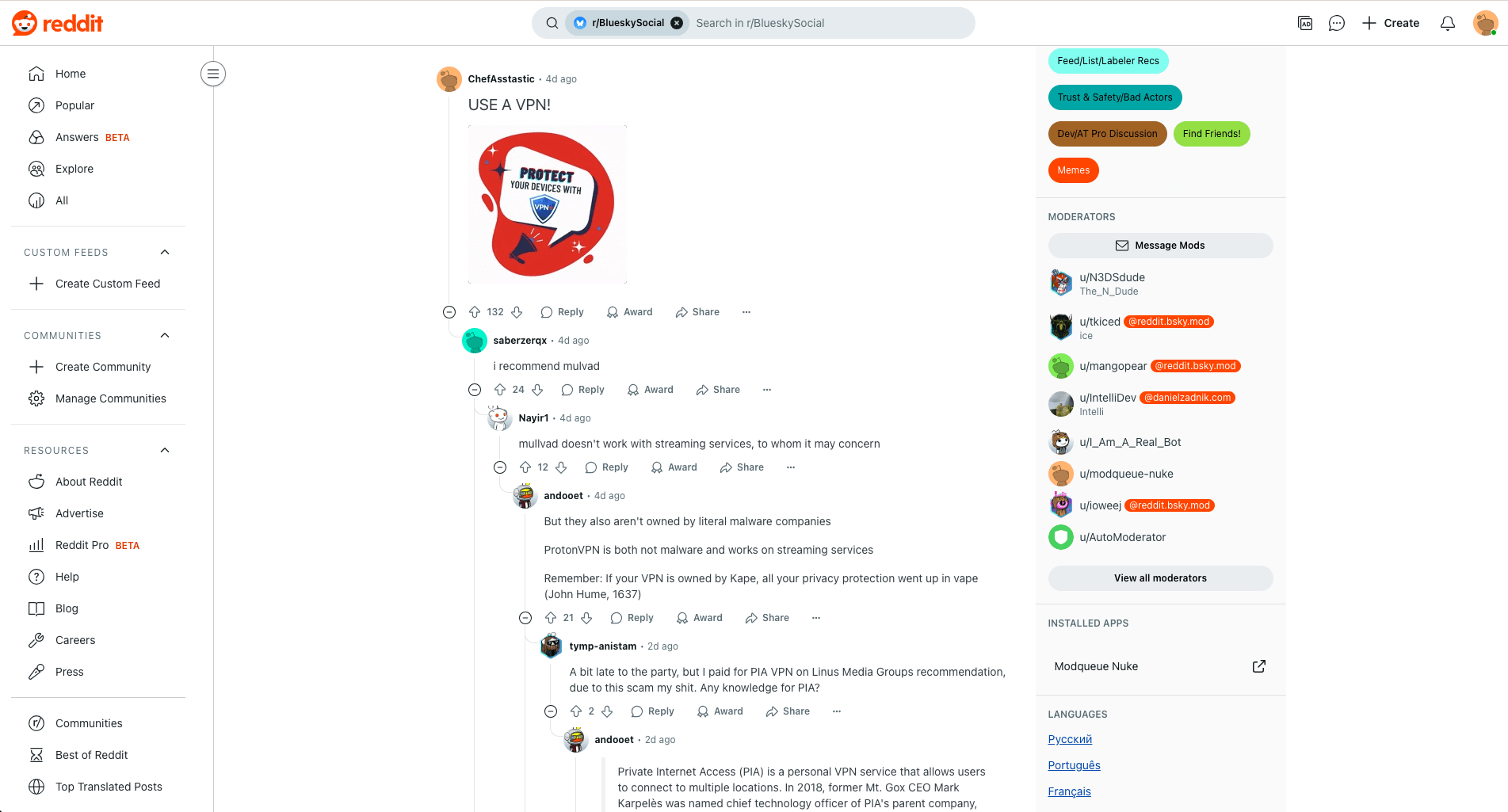
Services like Mullvad, ProtonVPN, X-VPN, and Private Internet Access were all mentioned, while also cautioning about figuring out VPN company relationships and interest connections first to avoid having your personal data monetized.
But is Bluesky the only platform affected? This move by Mississippi inevitably raises the question: Will Facebook, X(former Twitter), YouTube, and other apps face similar pressures?
What’s Next? Facebook, Twitter, YouTube or IG?
The legal challenge led by NetChoice makes it clear that Bluesky is far from alone in being impacted. According to NetChoice’s complaint, the law regulates services offered by several of its members:
- Meta, which owns and operates Facebook and Instagram
- Google, which owns and operates YouTube
- X (formerly Twitter)
- Snap Inc., which owns and operates Snapchat
- Pinterest and Nextdoor
- Dreamwidth
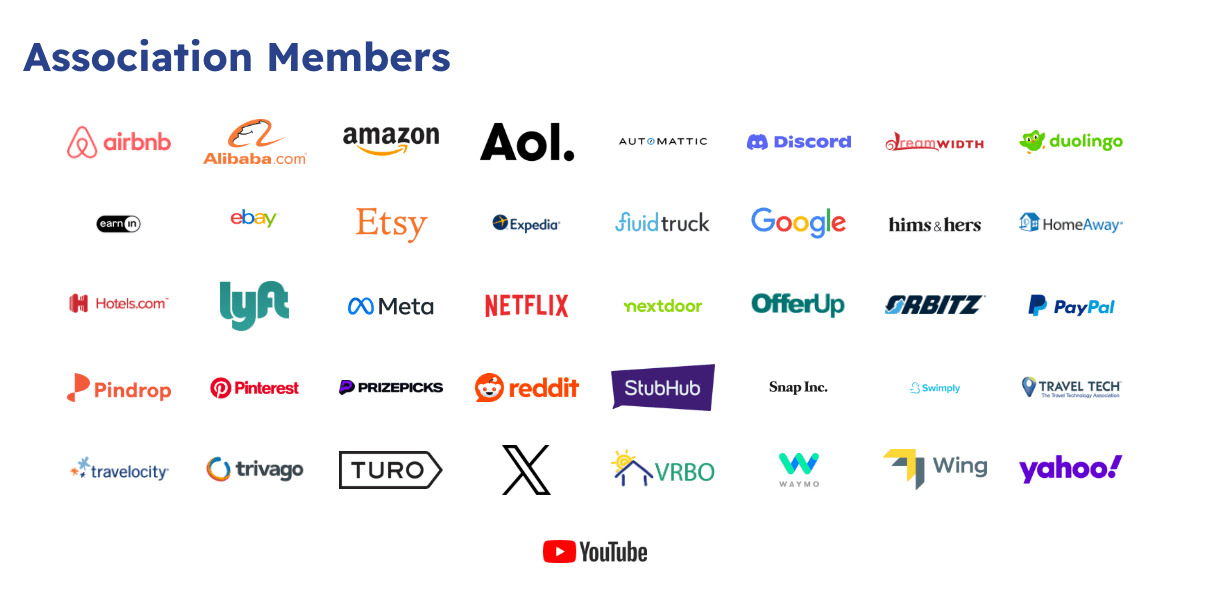
Bluesky’s exit has sharply focused attention on a critical question: will other major platforms follow suit?
Unlike the smaller, resource-constrained Bluesky, these tech giants possess vast legal war chests and large compliance teams. Their most likely course of action is not to withdraw, but to double down on the legal fight through NetChoice, or develop a reasonable verifying process as required.
NetChoice has a proven track record, having “permanently blocked similar laws in Arkansas and Ohio and halted others as our cases proceed in Florida, Texas, Utah and California.”
Despite a setback in August 2025 when the U.S. Supreme Court denied NetChoice’s emergency application to temporarily block the law. NetChoice’s battle in Mississippi is ongoing, with a firm belief that they “will succeed at ultimately striking down Mississippi’s law.” In the interim, the large platforms are likely exploring technical compliance options while the litigation continues.
Final Words
For now, other social media users in Mississippi may not notice immediate changes. Big companies can afford to comply, but smaller ones like Bluesky cannot. This could potentially strengthen the market dominance of a few large companies. The outcome of NetChoice’s lawsuit will show if Bluesky’s withdrawal is just the start or not. Stay tuned with SafePaper to wait and see how things develop.



